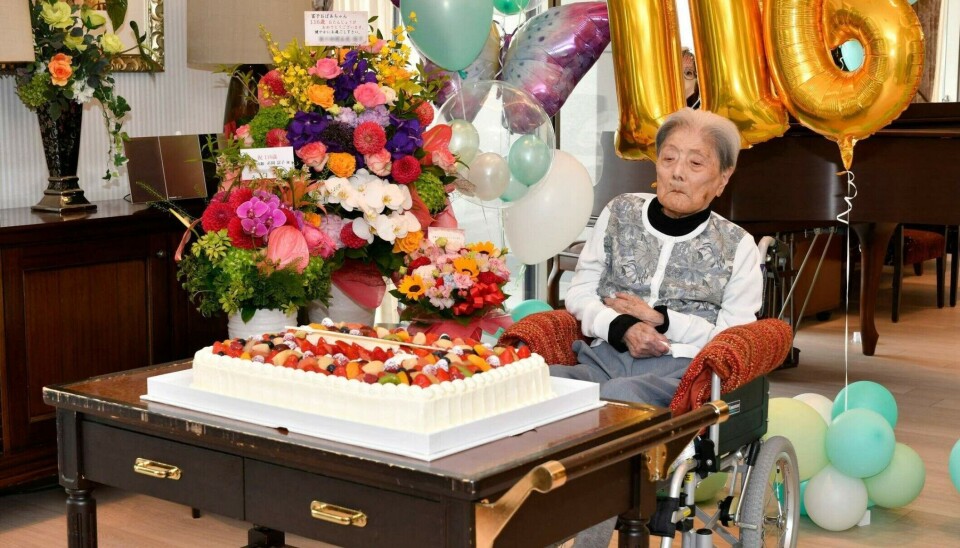
Researcher: Never take health and lifestyle advice from centenarians
When we only look at those who survived in their generation, we get a skewed view of reality.
When the world's oldest person, Spaniard Maria Branyas Morera, died at the age of 117 in August 2024, a Japanese woman took over the title.
Tomiko Itooka celebrated her 116th birthday in May.
She drinks a Japanese yoghurt-flavoured drink every morning. And she loves bananas, the AP news agency reported.
But asking the world's oldest people why they have lived so long is a bad idea, according to researchers.
May have unhealthy diets and smoke
“What you see with most centenarians most of the time – and these are generalisations – is that they don't take much exercise. Quite often, their diets are rather unhealthy,” Richard Faragher told The Guardian.
Some centenarians have even been heavy smokers.
But does that mean smoking is healthy after all? Absolutely not, according to Faragher, who studies ageing at Brighton University.
“Never, ever take health and lifestyle tips from a centenarian,” he told the British newspaper.
Good genes
His opinion is supported by Morten Valberg, who studies medical statistics at the University of Oslo.

“If you're interested in saying something more general about how to live to be a hundred years old, I agree that it's not necessarily best to ask centenarians,” Valberg wrote to sciencenorway.no.
Why some people live so long is still a mystery that researchers are trying to solve.
But one of the main theories is that they have good genes.
May have survived despite lifestyle
If you are naturally very robust, you might be able to tolerate eating two packs of bacon or smoking 40 cigarettes a day.
In that case, you have survived despite your lifestyle. Not because of it.
“If you only ask people who have lived to be a hundred years old, you could, at least in theory, find that factors we know are harmful to most people seem to have a positive effect on survival,” Valberg wrote.
Seemingly good habits, like eating bananas or taking long walks, also don’t necessarily correlate with centenarians' longevity.
A statistical phenomenon
The problem has its own name: survivorship bias.
When you only look at survivors, you get a distorted picture of reality, Valberg explains.
He uses a typical example from a Norwegian TV segment, where we see an old lightbulb that shines brightly after 100 years of use.
Most viewed
It's easy to think, "they made better lightbulbs back then."
The problem is that we only see the one bulb that has survived.
All the old lightbulbs that no longer work have disappeared from sight and mind.
“You’re comparing this one, robust, unique bulb with all those made today. It doesn’t necessarily mean we are generally worse at making lightbulbs today,” Valberg wrote.
Win an Oscar and live longer?
Or like when a study from some years ago revealed that actors who won an Oscar lived longer than those who were only nominated.
'Win an Oscar and live longer,' the Norwegian Broadcasting Corporation NRK wrote.
NRK was far from the only media outlet to jump on the news.
But the study garnered a lot of criticism from other researchers, precisely because of survivorship bias.
“Most actors must have held on for a while to have the opportunity to win an Oscar. So it was getting old that increased the chances of winning an Oscar, not the other way around,” Valberg wrote.
Better to follow a group of people over time
The same problem arises when asking centenarians for lifestyle advice.
Fortunately, there are other methods to figure out what is healthy and what is harmful.
“A better way to investigate what leads to a longer life would be to follow a group of people forward in time,” Valberg pointed out.
Imagine if we could follow an entire generation of people like Tomiko Itooka. In other words, everyone who was born in 1908.
We would probably discover that bananas were not a miracle cure. And that those who smoked, on average, died earlier than those who did not.
Hardly the most important explanation
Fortunately, smarter statistical methods exist.
Researchers do not have to follow an entire generation from birth to death to find answers.
But explaining why a single person lives to be very old is still difficult.
Eating healthy and exercising may have helped, but it is likely not the main explanation, if we are to believe researchers who study ageing.
Could be pure luck
According to Richard Faragher, there are two main theories as to why some people live exceptionally long.
In addition to the theory of good genes, some may simply have been lucky.
But Valberg is not entirely convinced of this.
“If by luck you mean that it's ‘completely random’ who lives so long, then I doubt that's the main reason,” he wrote.
———
Read the Norwegian version of this article on forskning.no






































